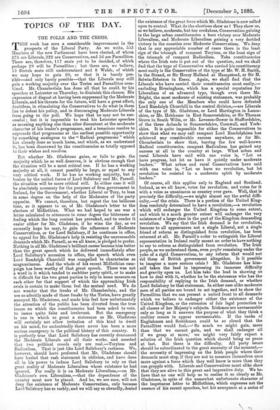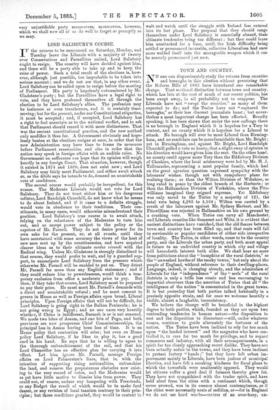TOPICS OF THE DAY.
THE POLLS AND THE CRISIS.
THIS week has seen a considerable improvement in the prospects of the Liberal Party. As we write, 533 Members of the new Parliament have been elected, of whom 275 are Liberals, 222 are Conservatives, and 56 are Parnellites. There are, therefore, 117 seats yet to be decided, of which perhaps 28 will be Parnellites ; but there are, we believe, 13 Scotch seats still undetermined and 8 Welsh, of which we may hope to gain 20, so that it is barely pos- sible—and only barely possible—that the Liberals may still gain a working majority over the Tories and Parnellites com- bined. Mr. Chamberlain has done all that he could, by his speeches at Leicester on Thursday, to diminish this chance. His expression of disgust at having been suppressed by the Moderate Liberals, and his threats for the future, will have a great effect, doubtless, in stimulating the Conservatives to do what in them lies to defeat his policy, and in discouraging Moderate Liberals from going to the poll. We hope that he may not be suc- cessful ; but it is impossible to read his Leicester speeches as meaning anything else than utter discontent at the moderate character of his leader's programme, and a tenacious resolve to supersede that programme at the earliest possible opportunity by something analogous to the " Radical programme" which has already done so much harm, and which, as we understand it, has been disavowed by the constituencies as totally opposed to their wishes and resolves.
But whether Mr. Gladstone gains, or fails to gain, the majority which he so well deserves, it is obvious enough that the situation will be a most critical one. If he has a working majority at all, it cannot possibly be large, or equal to any very critical work. If he has no working majority, but is beaten by the united forces of Lord Salisbury and Mr. Parnell, the situation will be more critical still. In either case it will be absolutely necessary for the purposes of firm government in Ireland, for the Government, whether Liberal or Tory, to lean in some degree on the help of the Moderates of the party opposite. We cannot, therefore, but regret the too bellicose tone, as it appears to us, of Mr. Gladstone's letter to the electors of Midlothian. What we had hoped to see was a letter calculated to attenuate in some degree the bitterness of feeling which the long contest has provoked, and to render it easier either for Mr. Gladstone, if he wins the day, as we earnestly hope he may, to gain the adherence of Moderate Conservatives, or for Lord Salisbury, if he continues in office, to appeal for Mr. Gladstone's help in resisting the unreasonable demands which Mr. Parnell, as we all know, is pledged to prefer. Nothing in all Mr. Gladstone's brilliant career became him better than the great speech which he delivered immediately after Lord Salisbury's accession to office, the speech which even Lord Randolph Churchill was comtelled to characterise as magnanimous. And the whole of his recent Midlothian cam- paign has been worthy of that great speech. There was not a word in it which tended to embitter party spirit, or to make it difficult for the two great parties to rely in some measure on each other for that support of which the approaching Irish crisis is certain to make them feel the mutual need. We do not wonder that the freaks of Mr. Chamberlain, and the use so adroitly made of those freaks by the Tories, have greatly annoyed Mr. Gladstone, and made him feel how unfortunately the attention of the public has been diverted from the true issues on which the constituencies had been asked to vote, to issues quite false and irrelevant. But the emergency is one in which so great a statesman as Mr. Gladstone will certainly not allow irritation of this kind to dwell on his mind, for undoubtedly there never has been a more serious emergency in the political history of this country. It is perfectly true that Lord Salisbury has recently denounced the Moderate Liberals and all their works, and asserted that two political creeds only are real.—Toryism and Radicalism. That is just like Lord Salisbury's rashness. We, however, should have preferred that Mr. Gladstone should have buried that rash statement in oblivion, and have done all in his power to induce Lord Salisbury to rely on that great reality of Moderate Liberalism whose existence he had ignored. For really it is on Moderate Liberalism,—on Mr. Gladstone's own Liberalism,—that the dependence of the country must now be placed. And he, we are sure, will not deny the existence of Moderate Conservatism, only because Lord Salisbury has so rashly, and we will say so absurdly, denied the existence of the great force which Mr. Gladstone is now called upon to control What do the elections show us ? They show us, as we believe, moderate, but too credulous, Conservatism gaining in the large urban constituencies a bare victory over Moderate Liberalism, and Moderate Liberalism gaining a very decided victory in the counties over Moderate Conservatism. We deny that in any appreciable number of cases there is the least sign of the triumph of rampant Toryism, or the least sign of the triumph of rampant Radicalism. Take constituencies where the Irish vote is put out of the question, and we shall find that the type of Conservative who carried his constituency most easily is the Conservative of the type of Mr. W. H. Smith, in the Strand, or Sir Henry Holland at Hampstead, or Sir H. Selwin-Ibbetson in Essex. Again, we shall find that the Liberals who have carried their constituencies most easily,— excluding Birmingham, which has a special reputation for Liberalism of an advanced type, though even there Mr. Bright, the most moderate of existing statesmen, was probably the only one of the Members who could have defeated Lord Randolph Churchill in the central division,—are Liberals of the type of Mr. Gladstone, or Lord Hartington in Lanca- shire, or Mr. Hobhouse in East Somersetshire, or Sir Thomas Grove in South Wilts, or Mr. Leveson-Gower in Staffordshire,. of the three Aclands in Somersetshire, Cornwall, and York- shire. It is quite impossible for either the Conservatives to show that what we may call rampant Lord Randolphism has. achieved any considerable success anywhere, or for Mr. Chamberlain to show that, barring the few well-known Radical constituencies, rampant Radicalism has gained any success at all in the country at large. What urban and rural Liberals have said with one voice is, "Let us have progress, but let us have it quietly under moderate leaders." What urban and rural Conservatives have said with one voice is, "Let us have no revolution, but let revolution be resisted in a moderate spirit by moderate leaders."
Of course, all this applies only to England and Scotland. Ireland, as we all know, votes for revolution, and votes for it with a voice as unanimous as country ever gave. Well, that is precisely the difficulty,—we might almost say the awful diffi- culty,—of the crisis. There is a portion of the United King- dom resolutely determined to have a revolution,—a revolution which will endanger the 'United Kingdom to some extent, and which to a much greater extent will endanger the very existence of a large class in the part of the Kingdom demanding revolution. We say that the Irish demand is for revolution, because to all appearances not a single Liberal, not a single friend of reform as distinguished from revolution, has been returned at all. Mr. Parnell's order to extinguish the Liberal representation in Ireland really meant an order to have nothing to say to reform as distinguished from revolution. The Irish people, as we understand them, even prefer remaining under the yoke of a rigid Conservatism, to any reform that would not rid them of British government altogether. Is it possible to imagine a more serious crisis ? Mr. Gladstone has him- self taken the lead in impressing its immense difficulty and gravity upon us. Let him take the lead in showing us how to deal with it, whether he be the statesman who has the responsibility of replying to the Irish demand, or whether Lord Salisbury be that statesman. In either case alike moderate men of all parties are bound to act together, and to show the Parnellites that we can present a united front to all demands which we believe to endanger either the existence of the United Kingdom or the extension of fair legal protection to all classes of her, Majesty's subjects. Irishmen are unreasonable only so long as it answers the purpose of what they think a craftier reason to appear unreasonable. If the ranks of Englishmen and Scotchmen could be so closed that the Parnellites would feel,—' So much we might gain, more than that we cannot gain, and we shall endanger all if we grasp at more,' we might very fairly expect a solution of the Irish question which should bring us peace
at last. But there is the difficulty. All party issues should be subordinated to the great necessity of the moment,— the necessity of impressing on the Irish people where their demands must stop, if they are not to measure themselves once more against a force which they well know is more than they can grapple with. Liberals and Conservatives must alike show that they are alive to this great and imperative duty. We be- lieve that no one will help us to realise it so clearly as Mr. Gladstone, in spite of the somewhat unfortunate character of the impetuous letter to Midlothian, which expresses not the essence of his recent speeches, but his annoyance at a series of
very unjustifiable party manoeuvres, manceuvres, however, which we shall now all of us do well to forget as promptly as We may.







































 Previous page
Previous page